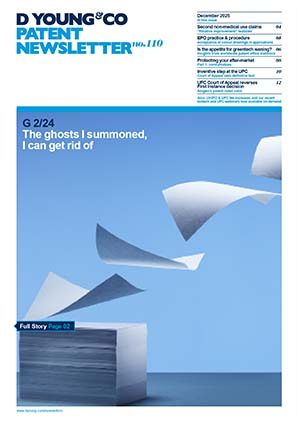Permissibility of new arguments and facts during proceedings: comparing EPO and UPC practice
For patentees and opponents alike, the ability to put forward new arguments is a valuable element of any opposition or appeal action at the European Patent Office (EPO), or during infringement and validity proceedings at the Unified Patent Court (UPC).
In this article we will review the statutory requirements for “late filed submissions” before the Opposition Division and Boards of Appeal of the EPO and compare those requirements to recent decisions regarding case amendments in proceedings before the UPC. Namely, the recent orders in Sunstar Engineering Europe GmbH (Sunstar) v CeraCon GmbH (CeraCon) (UPC_CFI_745/2024) and Fingon LLC (Fingon) v Samsung Electronic GmbH and Samsung Electronics France SAS (Samsung) (UPC_CFI_750/2024).
The permissibility of late-filed submissions before the Opposition Division
Before the Opposition Division, the permissibility of “late-filed submissions” is governed by Article 114(2) and implemented by Rule 116(1) of the European Patent Convention which together permit:
- the EPO to disregard facts or evidence which are not submitted in due time by the parties concerned; and
- new arguments and evidence to be filed up until the date specified in the summons to oral proceedings, and subsequently at the Opposition Division’s discretion.
The permissibility of “late-filed submissions” before the Boards of Appeal
In contrast to the generous provisions governing submissions before the Opposition Division, the Boards of Appeal apply a much stricter approach to the permissibility of “late-filed submissions”, governed by the Rules of Procedure of the Boards of Appeal, which state:
- that the statement of the grounds of appeal must contain the party’s complete appeal case;
- that the Board of Appeal shall not admit requests, facts, objections or evidence which were not admitted in the proceedings leading to the decision under appeal, unless the decision not to admit them suffered from an error in the use of discretion, or unless the circumstances of the appeal case justify their admittance; and
- that any amendment may be admitted only at the discretion of the Board of Appeal.
The permissibility of “case amendments” before the UPC
In comparison to the strict requirements before the Board of Appeal, the requirements at the UPC more closely resemble those in proceedings before the Opposition Division, and are governed by Rule 263 of the UPC Rules of Procedure, which state:
- A party may at any stage of the proceedings apply to the court for leave to change its claim or to amend its case, including adding a counterclaim. Any such application shall explain why such change or amendment was not included in the original pleading.
- […] leave shall not be granted if, all circumstances considered, the party seeking the amendment cannot satisfy the court that: (a) the amendment in question could not have been made with reasonable diligence at an earlier stage; and (b) the amendment will not unreasonably hinder the other party in the conduct of its action.
The requirements of reasonable diligence and unreasonable hindrance play a key role in the assessment of the orders discussed in this article.
Sunstar Engineering Europe GmbH v CeraCon GmbH (UPC_CFI_745/2024)
In ORD_22156/2025, CeraCon sought to amend its counterclaim for revocation by introducing a new novelty attack, based upon a new patent document (EP3868480).
CeraCon argued that EP3868480 (nor any of its family members) had been located in its prior art search, which a well-known search service provider had undertaken. Instead, the document and its relevance to the proceedings had only been brought to its attention after filing its counterclaim for revocation; by one of their attorneys reporting on a search unrelated to the counterclaim at hand. CeraCon pointed out that, upon discovering the document, it reanalysed the search strings used in a well-known search software, and obtained EP3868480 as the fifth hit.
CeraCon therefore argued that Rule 263 should be applied generously (if at all) in the present case. In particular, because it had been diligent in carrying out a specialised search and the search should have picked up on EP3868480. Furthermore EP3868480 is a patent application of Sunstar, and was filed by the same attorneys representing Sunstar in the UPC proceedings (and therefore would not unreasonably hinder Sunstar in its rejoinder), and EP3868480 was of prima facie relevance.
The court disagreed.
When making its decision the court weighed up the interests of the parties; but considered that the interests of the party in not having to defend itself for the first time in its rejoinder regularly outweighs other considerations. The court also noted that such decisions must take into account all the circumstances of the individual case.
However, the court was clear in its finding that the individual circumstances of the present case did not render the amendment allowable. In particular, it noted that, as demonstrated by CeraCon, EP3868480 should have been found in the initial search, and that the mere fact that EP3868480 was a patent of Sunstar did not mean that formulating a response to its inclusion did not unreasonably hinder Sunstar in its rejoinder.
Fingon LLC v Samsung Electronic GmbH and Samsung Electronics France SAS (UPC_CFI_750/2024)
In ORD_25877/2025, Samsung objected to Fingon’s reply in the infringement proceedings, which it argued, based the infringement actions on new facts, without having requested leave to amend the case.
In particular, Samsung argued that Fingon relied on new models (of mobile phone) which only released this year. These were different products than those originally attacked in Fingon’s statement; and furthermore that the newly introduced Trusted Applications (a mobile phone application which runs inside a trusted execution environment) also constituted amendment of the case. Samsung argued that these new factual allegations and products required a comprehensive analysis and assessment, thus the requirements of Rule 263 were not met.
The court disagreed.
In laying out its decision, the court noted that not every new argument constitutes an amendment of the case within the scope of Rule 263. Instead, amendment of a case occurs when the nature or scope of the dispute changes (for example, if a new patent document is invoked or a new product is objected to).
Despite pointing out that objection to a new product would normally constitute a change in the nature or scope of a dispute, the court held that the new references by Fingon were to “illustrative examples” of how the attacked embodiment allegedly works, rather than distinct products themselves.
This point particularly rested upon the facts of the case, where infringement was formulated in relation to [a group of] products which implemented infringing functionalities rather than specific infringing products; and neither Fingon nor Samsung argued that the new products differed in the allegedly infringing features. This also appeared to be the deciding factor in the Board of Appeal not allowing Samsung an extension of the time period pursuant to Rule 29 of the Rules of Procedure, as the specific functionalities referred to in said examples had already been included in Fingon’s initial claim, and thus available for counter in Samsung’s rejoinder.
Whilst the court did not comment on the point, one could infer that a product not yet having been released prior to the initial case submissions, and therefore being impossible to include, would meet the requirement of reasonable diligence.
Summary
It is clear that the individual circumstances of each case will be a key factor in any permissibility of claim amendments before the UPC.
However, it appears that any party wishing to put forward new arguments will face serious hurdles in overcoming the interests of a party not having to defend itself for the first time in a rejoinder. Practitioners should take note that new attacks based on new documents, no matter how prima facie relevant or well known, are unlikely to be allowed if they are considered to unreasonably hinder the opposing party.
Accordingly, as far as possible, a party’s complete set of arguments should be contained in its initial case, similar to the need to put all arguments forward before the Board of Appeal.
On the other hand, further evidence of potential infringement, such as the release of a new product by a party, may be allowable depending on the facts of the case, and careful attention should be paid to the formulation of the initial allegation of infringement; in view of any potential upcoming disclosure or product release.
If you are considering initiating a legal action before the UPC or want more information on the potential permissibility of case amendments at the UPC, please contact your usual D Young & Co representative for further information.
Case details at a glance
Decision level: Mannheim Local Division
Order: ORD_25877/2025
Parties: Fingon LLC v Samsung Electronics France SAS and Samsung Electronics GmbH
Date: 05 June 2025
Decision: dycip.com/UPC-ORD-25877-2025
Decision level: Mannheim Local Division
Order: ORD_22156/2025
Parties: Sunstar Engineering Europe GmbH v CeraCon GmbH
Date: 06 June 2025
Decision: dycip.com/UPC-ORD-22156-2025

